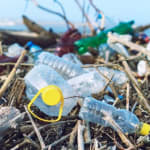
The European Union moved closer to banning single-use plastics like forks and knives after the EU Council, the European Parliament and the European Commission signed off on a provisional agreement that forms part of the 28-nation bloc’s strategy to reduce marine litter.
The draft “Directive”, approved on 19 December 2018 by the three EU institutions, has swiftly advanced through the EU’s normally sluggish legislative machinery from the time the EC first announced its vision early in 2018. Its draft in May 2018 had undergone significant revisions after passing through parliament and the council in the subsequent seven months. The EU hopes to conclude the legislative process in the spring of 2019 and for member states to incorporate the measures into national laws which must come into force by 2021.
The ban covers the top ten items that are frequently found on European beaches, such as cutlery, plates, drinking straws, cotton bud sticks, balloon holder sticks but also oxo-degradable plastic products and fishing gears. EPS-made containers for food and beverages as well as EPS-made beverage cups are also on the list.
There will be a binding target of 25% of recycled plastic for PET beverage bottles in 2025 and 30% in 2030. Parliament had previously aspired for 35% by 2025. Producers of tobacco filters will be subject to an “extended producer responsibility scheme” (EPRs) and bear the costs of public collection systems for cigarette stubs.
While environment campaigners were pleased with the agreement, they noted some compromises also had to be made. Rethink Plastic and Break Free From Plastic said the deal has no binding target to cut the use of food containers and cups. There is no obligation for EU countries to adopt targets either. The group said the EU wording was for countries to "significantly reduce" their usage, leaving it vague and open.
Break Free From Plastic said the 90% target of separate collection for plastic bottles in 2025 has been postponed to 2029, with an intermediary 77% benchmark by 2025. EU countries are also allowed to opt for voluntary agreements between industry and authorities in order to cut usage of plastic products and implement certain EPR measures. An obligation to make sure that plastic caps/covers remain attached to containers was also delayed by three years from 2021 to 2024, it said.
French plastic and flexible packaging manufacturers association Elipso complained the deal was adopted only after seven months of discussion and was not backed by in-depth studies. Its German partner Industrievereinigung Kunststoffverpackungen echoed the sentiment, saying the negotiation period was “extremely short” and that there was no detailed analysis on consequences of these measures.
European Plastic Converters said the proposal was based on a “poor risk assessment” of the possible environmental impact and could lead to serious barriers to the free movement of goods in the EU single market. The European Federation for Waste Management and Environmental Services, however, welcomed it. The measures were a “crucial signal” to boost investment in collection, sorting and recycling across Europe, it said.


